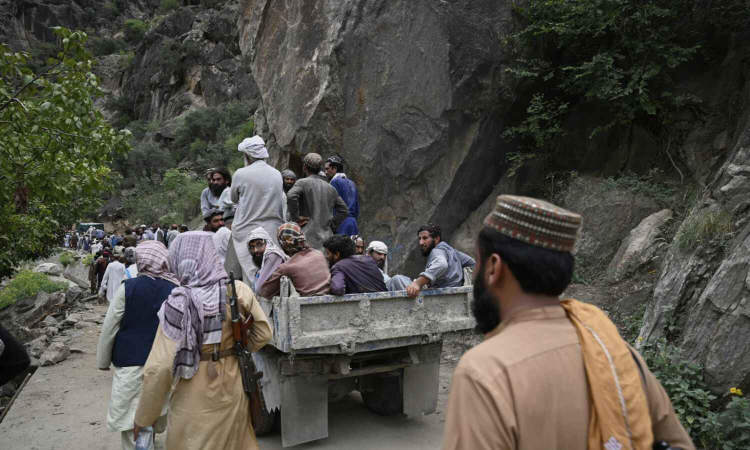Afghanistan quake destroyed 5,230 homes in 49 villages -- but UN hasn't gotten to 362 others
The earthquake struck on August 31, killing at least 2,200 people, and that figure could rise as more bodies are recovered.

Residents from surrounding towns and villages try to reach the quake-hit region to assist survivors after Sunday night's powerful 6.0-magnitude earthquake that struck several provinces, in the Nurgol district, Kunar province, eastern Afghanistan (AP Photo)
UNITED NATIONS: An initial United Nations assessment of the impact of Afghanistan's recent deadly earthquake found 5,230 homes destroyed and 672 damaged in 49 villages — but the UN hasn't been able to get to the vast majority of the remote villages.
Shannon O'Hara, the coordination chief for the UN humanitarian office in Afghanistan, said Monday that damaged roads in the country's rugged and mountainous east where the 6.0 magnitude quake struck have made it extremely difficult to assess the impact in the 441 affected villages.
A series of aftershocks ranging from 5.2 to 5.6 in magnitude added to the difficulties, she said.
The earthquake struck on August 31, killing at least 2,200 people, and that figure could rise as more bodies are recovered. The United Nations estimates the quake has affected up to 500,000 people, more than half of them children and some of them Afghans forcibly returned from neighbouring Pakistan and Iran.
As an example of the difficulties the UN team has faced, O'Hara said it took her more than 6 1/2 hours to get from Jalalabad, the largest city near the quake area, to the worst-hit area roughly 100 kilometers away on the only road — a narrow, single-lane track carved into the mountainside blocked in places by large rocks from landslides.
Many vehicles, including trucks loaded with humanitarian aid, were trying to get up and down the valley to help, she said.
“As we drove towards the epicentre, we saw families walking in the opposite direction — displaced, carrying what little they could. Many were still wearing the same clothes from the night of the earthquake,” O'Hara said. “Mothers and fathers were carrying their children, some with fresh bandages covering their injuries.”
She said the devastation got worse as the UN team got closer to the epicentre, with entire villages destroyed and the overpowering smell of dead animals.
Some families who have lost their homes and livelihoods were living in crowded tents, while many others were sleeping under the open skies, exposed to rain and cold.
“There was no clean drinking water and no sanitation, with cholera endemic in the region, and initial assessments indicating that 92 per cent of these communities are practicing open defecation,” she said. “The potential for a cholera outbreak is alarming. “
O'Hara, who has been in the quake-affected region for five days, reported the initial assessment at a video press conference with UN journalists.
She said the needs are overwhelming — clean water, food, tents, latrines and warm clothing as the region nears the start of winter snows at the end of October.
In visits to three camps for displaced people on Monday, O'Hara said women in particular emphasised their need for clean water and adequate clothing for themselves and for their children.
She said time is of the essence. “Any day, rainfall could cause flash floods in the valleys” where camps for the displaced have been set up and ”additional aftershocks could cause more severe landslides, cutting off access to communities still living near the epicentre," O'Hara said.
“And snow will cut off access to these mountain valleys,” she said. “If we don't act now, these communities may not survive the coming winter.”
The United Nations will be issuing an emergency appeal Tuesday for desperately needed funding to help quake survivors, O'Hara said.
She said Afghanistan's ruling Taliban authorities took the lead in search and rescue operations and there has been no major obstruction to humanitarian operations.
As for women and girls whose activities are drastically curtailed by the Taliban, O'Hara said she had not received any reports of women being left behind by male-only rescue teams, and the UN is ensuring that women are part of health teams and aid distribution operations.



